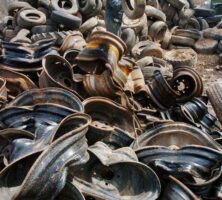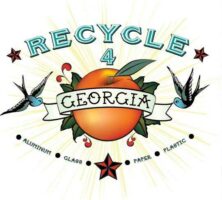The federal Resource Conservation and Recovery Act (RCRA) was established in 1976 as an amendment to the 1965 Solid Waste Disposal Act, with the dual purpose of protecting human and environmental health and reducing waste. In Georgia, RCRA is enforced by the Hazardous Waste Management Branch of the Environmental Protection Division (EPD), which is a part of the Georgia Department of Natural Resources.

Courtesy of Atlanta Journal-Constitution.
By the late twentieth century the United States was producing millions of tons of waste annually. RCRA was enacted by the U.S. Congress to address the management and disposal of these solid and hazardous wastes. The legislation’s main goals include protecting human and environmental health from waste disposals, conserving energy and natural resources, decreasing the generation of wastes, and making certain that wastes are managed properly. RCRA contains nine subtitles, each of which addresses a particular issue of resource conservation and waste management.
Subtitle A: General provisions
Subtitle B: Office of Solid Waste; authority of the U.S. Environmental Protection Agency administrator
Subtitle C: Hazardous-waste management from generation to disposal
Subtitle D: Nonhazardous solid wastes; state or regional solid-waste plans
Subtitle E: Duties of the secretary of commerce in resource recovery
Subtitle F: Federal responsibilities
Subtitle G: Miscellaneous provisions
Subtitle H: Research, development, demonstration, and information
Subtitle I: Underground storage tanks
These regulations identify the requirements of proper waste disposal and management for a sustainable environment. RCRA provisions are continually changing to address new issues; in 1984, for example, the Hazardous and Solid Waste Amendments (HSWA) were enacted.
Hazardous and Solid Waste Amendments
The HSWA of RCRA were created in the wake of public opposition to the improper disposal of hazardous wastes, and their passage marked a turning point for the advancement of hazardous-waste disposal practices. Of the approximately seventy provisions established by HWSA, more than fifty required the EPA to take action within the first year of the bill being signed.
HSWA brought about a number of changes, including the creation of programs and specific requirements for waste disposal. For example, the Land Disposal Restrictions (LDR) program ensures that toxic constituents present in hazardous waste are properly treated before that waste is disposed of on land. Under the LDR program mandatory technology-based treatment standards must be met before hazardous waste is placed in a landfill. HSWA also established RCRA Corrective Action requirements, which pertain to the parties responsible for hazardous waste releases into air, soil, groundwater, and surface water. The Corrective Action requirements also strengthen the federal enforcement of RCRA by expanding the list of prohibited actions. If someone is found in violation of these prohibited actions, criminal penalties may ensue.
Georgia Programs
Georgia has established a variety of programs to implement changes in waste management practices for future environmental sustainability. One specific example is the state’s waste-reduction plan program. Administered by the Hazardous Waste Management Branch of Georgia’s EPD, this plan requires that all large-quantity generators submit a waste-reduction plan every two years. These plans must outline current waste production at the facility and include procedures for reduction of that waste. Another state program is Recycle 4 Georgia. Organized by the Office of Environmental Management of the Georgia Department of Community Affairs, Recycle 4 Georgia provides local governments with recycling trailers for use at special events.

Courtesy of Recycle 4 Georgia






